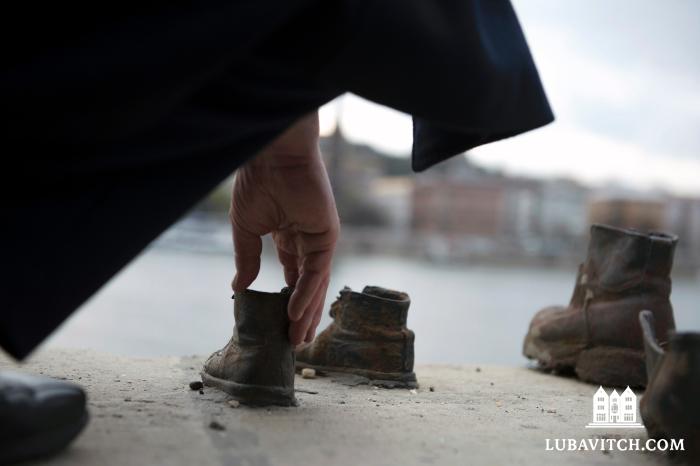More than three hundred rabbis from across Europe, a large number of them Chabad-Lubavitch emissaries, convened in Budapest, Hungary on Monday for the annual conference of the Rabbinical Congress of Europe (RCE).
The conference, hosted by the RCE and the European Jewish Association (EJA), is usually held in Jerusalem, but was strategically moved to the Hungarian capital this year as a public show of solidarity with Hungary’s Jews. As Hungary marks 70 years since its Jews were murdered during the Holocaust, its current Jewish population of 100,000—Europe’s second-largest—is seeing alarming anti-Semitic rhetoric.
“The choice of Hungary as the host country for the event is designed to demonstrate to the Hungarian authorities the common concerns of European Jewry regarding the situation of the Hungarian Jewish community, as well as sending out a message of solidarity with the Hungarian Jewish community, and European Jewry as a whole,” said RCE’s director, Rabbi Menachem Margolin.
70 Years since the Holocaust
The three-day rabbinical conference, which is largely focusing on counteracting European Jews’ high assimilation rates and the widespread growth of anti-Semitism, began Monday morning with a solemn ceremony remembering the 568,000 Hungarian Jews murdered by the Nazis in 1944.
The ceremony took place on the banks of the Danube River at the “Shoes on the Danube Promenade” memorial. The memorial displays 60 pairs of iron shoes, in commemoration of the Jewish victims, who were forced to take off their shoes before being shot into the river. In memory of the murdered, the hundreds of attendees participated in a “March of the Living,” walking along the riverbank linking arms and singing traditional Jewish songs of hope and renewal.
Following the march, participants reconvened in an ancient synagogue to hear words of inspiration from local and visiting Rabbis. The event was opened by Chabad emissary Rabbi Shlomo Koves, head of the Unified Hungarian Jewish Congregation, or EMIH, which co-organized the conference. A school-boy choir of students from Chabad’s local Talmud Torah sang for the audience, reminding many that despite past horrors, Judaism in Budapest was still alive and well.
The ceremony was attended by both of Israel’s Chief Rabbis, Rabbi Yitzchak Yosef and Rabbi David Lau, 91-year-old holocaust survivor Rabbi Menachem Mendel Taub, the Kaliver Rebbe, as well as by Israel’s Deputy Minister for Religious Affairs, Rabbi Eli Ben-Dahan. Representatives of the Hungarian government were in attendance as well.
“Simply to have a memorial gathering or a slogan ‘never again’ is not enough,” said Rabbi David Moshe Liebermann, Chief Rabbi of the Shomre Hadas congregation in Antwerp, Belgium, in a heartfelt message to the participants, “if we are not inspired with the same passion for strengthening the Jewish people as the murderers and the haters are inspired to destroy.”
Rising Anti-Semitism Today
The message is timely as Hungary’s Jews have faced a veritable storm of ugly attacks over the last few years, some occurring just days before the conference began. The hate crimes include: Nazi graffiti; verbal abuse; desecration of Jewish cemeteries; pig trotters draped over a statue of Raoul Wallenberg, the hero who saved tens of thousands of Jews; public intimidation at national sport games; anti-Jew rallies; sporadic physical attacks; public Menorah displays being kicked over and more.
A new comprehensive survey presented on Monday by the Action and Protection Foundation, a watchdog on anti-Semitism of the Jewish community, revealed that anti-Semitic attitudes in Hungary showed up to 40 percent of respondents accepted some anti-Semitic attitudes. The survey, which was conducted in December polled 1,200 people.
“We can draw the conclusion that 35 to 40 percent of the sample definitely accept some anti-Semitic stereotypes and 7 percent extremely anti-Semitic stereotypes,” said Andras Kovacs of the Central European University, who supervised the research.
Kovacs added that among those who accepted some anti-Semitic stereotypes, the proportion of people who displayed open antipathy toward Jewish individuals increased dramatically in 2010, when the xenophobic far-right Jobbik party entered parliament for the first time. With 43 of the 386 seats in Parliament, Jobbik, an openly anti-Semitic group, is the third largest party in Hungary.
Kovacs asserts, “There is a clear correlation between Jobbik’s entrance and the prevalence of anti-Semitism in polled populations.”
Strengthening Jewish Life
The conference aims to combat these growing concerns by discussing issues directly related to fighting anti-Semitism, and even more so, fighting assimilation and communal attrition. On Tuesday and Wednesday, hundreds of rabbis, many of them heads of a myriad of European Jewish organizations, will participate in a series of roundtable sessions and presentations in an effort to formulate solutions for European Jewry’s biggest threats.
Rabbi Margolin, a chief organizer of the event said that the conference also intends to “address the issues that most affect Jewish religious life in Europe like banning of the religious practices of shechita and brit mila [circumcision].”
“While many people wish to focus attention principally on how to combat anti-Semitism, as a rabbinical organization we believe that we should also spend energies to assist thriving developing Jewish life.”
Rabbi Koves pointed to examples of expanding Jewish life in Hungary under Chabad’s leadership: new schools, reopened synagogues, and popular cultural festivals. “This conference sends a message that the best way to commemorate the Holocaust is by celebrating Jewish life today.”

Be the first to write a comment.